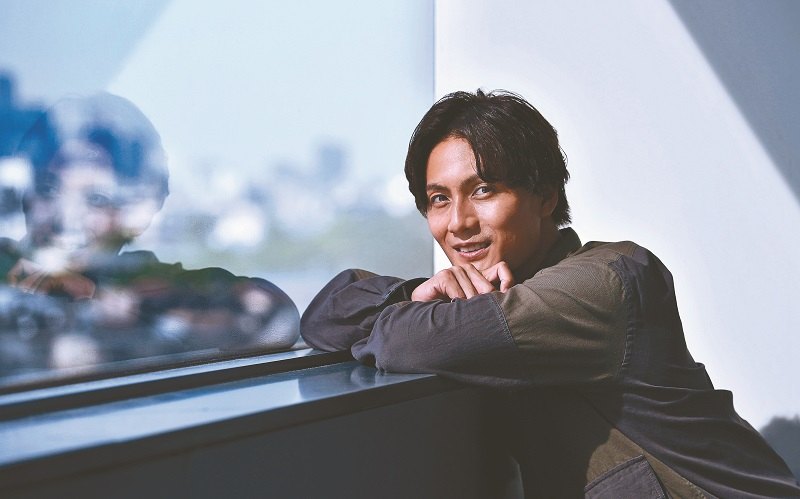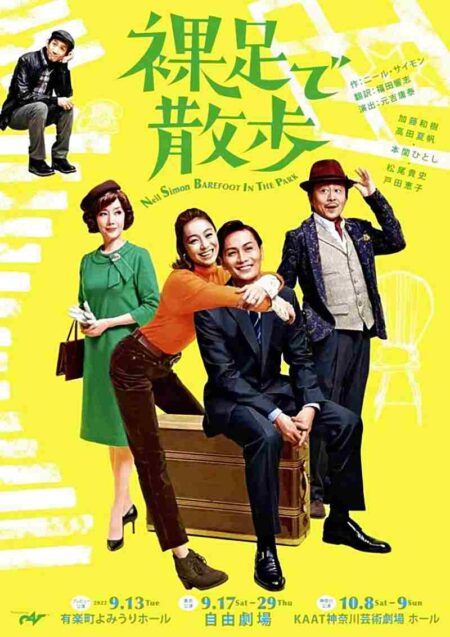Kazuki Kato: ‘I want to stay a clumsy actor’

Kazuki Kato
12:15 JST, September 9, 2022
Kazuki Kato cuts a dashing figure on stage with his chiseled good looks and robust singing voice. The singer-actor, who has graced many musicals and plays with his talent, is set to star in his first comedy, an upcoming production of Neil Simon’s masterpiece “Barefoot in the Park,” or “Hadashi de Sanpo” in Japanese.
The Yomiuri Shimbun recently met with Kato to learn about his commitment as an artist and get at the man himself.
“Barefoot in the Park” had its world premiere on Broadway in 1963. The popular romantic comedy was subsequently made into a film.
In the play, newlyweds Paul and Corie move into a shabby New York City apartment building, inhabited by residents who are all oddballs, and find that they don’t always see eye to eye. Much quarreling ensues.
“It’s not a comedy that tries to make the audience die laughing. Rather, little exchanges between the married couple and other characters make you chuckle. It’s a heartwarming story. I thought it would be meaningful to do this piece in times like these,” Kato said.
The staid Paul, the freewheeling Corie, Cories’s mother and Velasco, the man who lives in the building’s attic … There are not all that many characters, but they are all strange in one way or the other.
“Paul is a square and serious young man. Since he’s the meekest one, I’m thinking that the more sincere my portrayal of him is in the eyes of the audience, the funnier the play will be,” Kato said.

Conversations unfold rhythmically in the apartment, and Kato is taking extra care to time the interval between lines just right.
“I want to achieve a smooth performance that won’t make the audience wonder when they should be laughing,” he said.
While in general he intends to approach his role with a sense of ease and enjoyment since it’s a comedy, he is also hoping to attempt some extreme, over-the-top acting.
“I’m thinking of doing something outrageous at first. I’m super excited, so much so I might have to run around before the performance,” he said of his motivation.
“I have really long lines for the first time in a long while,” he said. “Rather than put together my part by myself, I want to experience each feeling produced by my fellow actors and savor them, one by one. I look forward to seeing how we can weave a story that draws chuckles from the audience.”
A preview of “Barefoot in the Park” will take place on Sept. 13 at Yurakucho Yomiuri Hall in Chiyoda Ward, Tokyo. Performances will run at the Jiyu Theatre in Minato Ward, Tokyo, from Sept. 17 to 29, and at KAAT Kanagawa Arts Theatre in Yokohama on Oct. 8 and 9. There will be performances in Hyogo Prefecture, Osaka Prefecture and Tama, Tokyo, too.
Days of anxiety
Kato, an Aichi Prefecture native, was born on Oct. 7, 1984. He ventured into the showbiz industry after becoming a finalist in the Junon Super Boy Contest, a male beauty pageant seen as a gateway for young actors. He gained fame when he played Keigo Atobe in the musical version of the popular manga “The Prince of Tennis” in 2005. Atobe is the tennis club captain of a rival school of the protagonist’s, and Kato portrayed this bossy character to the fullest.
“Many people learned about me in that production. It was the first musical I acted in, the first stage production I joined. I can’t talk about my career without referring to that production,” Kato said. “At the time, it was like a school drama club, a lot of fun. It let me get a taste of the joy of acting and singing in front of large groups of people.”
After making his CD debut in 2006, Kato worked both as an actor and a singer even though he was not as into acting as he was into music. During his 20s, he appeared in some TV dramas, too, such as “Hotaru no Hikari,” but more often than not he was unsure what to do. He could get into his role and become the character, but he was not able to play an ordinary, everyday person in a natural way.
“I really wondered what it meant to be normal. I didn’t know what to do. I lacked experience big time and was trying to fight without any weapon,” he said.
Then one musical yanked him out of his stagnation. In 2012, he appeared in “Coffee Prince,” which starred Ikusaburo Yamazaki. The actor’s performance made a great impact on Kato.
“We’re in the same generation, but he can sing and has great presentation skills,” he said.
He found himself wanting to act alongside Yamazaki in yet another musical, and decided to fully dedicate himself to musicals. He and Yamazaki were subsequently cast in the same musical, but since they played the same role in a double cast, they have not performed together since “Coffee Prince.”
“It’s inspiring to see someone in my generation doing great work. I think that our generation has to lead the movement to make musicals more accessible as entertainment [in Japan] as people tend to think that musicals are difficult to get into,” he said.
Finding himself
Another turning point in Kato’s career was the musical “Frankenstein” in which he costarred alongside Akinori Nakagawa. Nakagawa played the scientist Victor Frankenstein, while Kato played two roles: the military surgeon Henry Dupre and Frankenstein’s monster.
“The keys were high, and many of the songs were difficult,” Kato recalled. “I tend to act intuitively, but Akki-san [Nakagawa] is a logical person. I was under pressure, but the fact that I was able to overcome the challenge as his buddy gave me confidence. Akki-san has been someone I’ve always looked up to. I want to continue to follow in his path.”
Even though Kato made his name in musicals, he also continues to take on regular plays, such as with the current production of “Barefoot in the Park,” as he wants to keep pace with other actors in his generation by polishing his acting skills.
“There are plenty of people who can sing well, but if there is not enough feeling to go with the singing, then they’re just singing. If people think they don’t like musicals because actors start singing suddenly, that’s because of a lack of skill on the part of the actors,” he said.
Kato continues to make great strides as an actor. Last year, he received the Kazuo Kikuta Theater Award. On first glance, it appears that his life is perfect, but he said, “People often tell me I’m an unfortunate person,” a surprising and revealing expression of how those around him see him. “Perhaps there’s always been something missing from me. When I was young, I used to play it cool and cared only about my appearance, to be honest.”
The more mature he grew, the more he became able to show his true colors.
“I’ve become able to be who I really am. That’s why I don’t mind being an unfortunate person. Nobody is perfect, and I think a clumsy person has a better chance to be more versatile as an actor. I want to stay a clumsy actor,” he said.



